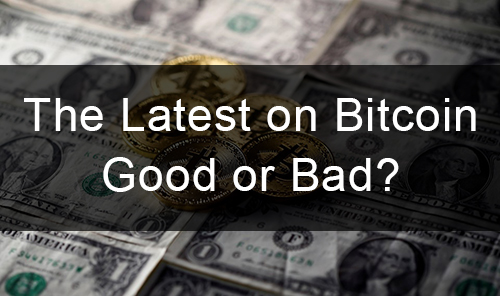The Latest on Bitcoin – Good or Bad? A bar of gold. A chain of beads. A disk of iron. A slip of cotton-linen paper. A card of plastic. These things are worthless. One can not eat them, or drink them, or use them as a blanket. However they are important, too. Their worth originates from the most basic thing. Individuals believe they are money, and so they are.
The Latest on Bitcoin – Good or Bad?

If every currency is a consensual delusion, then bitcoin, a digital cryptocurrency, feels more like a consensual hallucination on psychedelic drugs. The principle of bitcoin was born in an in-depth white paper released in late 2008 by a pseudonymous “Satoshi Nakamoto.” By 2013, one bitcoin was worth $12. Since this writing, it's worth more than $10,000. Its worth has actually doubled in the last 2 months alone. For any currency's value to increase by 100 percent in 8 weeks is, to utilize a technical term, bonkers. If the Japanese yen or American dollar did the same, their economies would plunge into an infernal deflationary spiral.
Throughout history, currency has taken one of two kinds: physical assets, like gold or beads, and fiat currency, like government-backed paper and coins. Bitcoin and its brethren present a third category: digital currencies that operate on a mix of game theory, economics, and cryptography– hence, cryptocurrencies. If all cash is the sharing of an illusion, bitcoin wants to develop a much better way to share it.
Like many people, we have long related to bitcoin's rise with both wonder and confusion. To sense of it, we started calling cryptocurrency specialists and experts to ask, is bitcoin simply a dumb bubble, like 17th-century tulip bulbs? An investment hedge, like gold? A currency, like dollars? The answers we got weren't unanimous. We heard “all of the above” and “none of the above” and “nobody knows for sure, yet.”
Towards a More Perfect Money
Exactly what's wrong with dollars, anyhow? If you ask me, hardly anything. I like my credit card. I don't even mind cash.
But to others, the dollar's dangers are glaringly apparent: a single supreme entity, the federal government, strictly controlling the cash supply and the rules that govern it. Some fret that the production of too many dollars will cause out-of-control inflation. “Cypherpunks have imagined totally decentralized electronic payment systems for decades” that would ease these concerns, states Timothy Lee, a senior tech-policy press reporter at Ars Technica who has actually long been on the bitcoin beat. Most digital-currency ideas, however, had the very same tragic flaw– replicability. Just about everything that exists online (believe text, images, or files) can be copied. Worry of rampant counterfeiting would spell death for a digital currency.
Bitcoin solved this issue with the blockchain, an online ledger that records and confirms all peer-to-peer payments to eliminate double-spending. For those inclined to less-than-legal behavior, it helps that the blockchain encrypts deals to provide anonymity. The payment network is preserved by bitcoin “miners,” a decentralized group of individuals with powerful computers that authorize deals and are rewarded with brand-new bitcoins for their work. The total possible supply of bitcoin on the planet is limited. Therefore, bitcoin fixes both of the cryptopunk loan problems– the blockchain thwarts centralization, and the planned shortage of bitcoins checks inflation.
The blockchain is an innovative and possibly transformative technology. Individuals like Marc Andreessen, the widely known venture capitalist, have actually anticipated that it might become the scaffolding of the whole economy, like the internet. Here's a taste of the transformative vision from an interview Andreessen done by The Washington Post:
Digital stocks. Digital equities. Digital fundraising for companies. Digital bonds. Digital contracts, digital secrets, digital title, who owns exactly what– digital title to your house, to your automobile … You've got digital voting, digital contracts, digital signatures … And then every aspect of monetary services: insurance coverage agreements, insurance coverage derivatives, currency exchange, remittance– on and on and on.
No one knows for sure whether the blockchain will change the economy of the future, as Andreessen predicts. Exactly what's clearer, nevertheless, is that it has not changed the economy these days. While the variety of bitcoin transactions is growing every year, it's absolutely nothing near to a mass-market customer technology, like Google, or Netflix, or even PayPal. Bitcoin remains troublesome to utilize (the common deal can take up to 10 minutes) and the rate is extremely volatile. It is, for now, a frankly terrible currency built on top of a possible transformative innovation.
Which results in possibly the most apparent question: If bitcoin appears to have flopped as a mass-market currency, why has it so all of a sudden succeeded as a financial investment car?
The Latest on Bitcoin – Up, Up, and Away
There are many theories about why bitcoin's has actually gone crazy. But for the sake of time and peace of mind, let's narrow them to four mega-arguments.
1. Equity capital (and a green light from the feds) got the ball rolling.
For the very first five years of bitcoin's presence, equity capital's interest in bitcoin-related products and business was minimal. After all, the very concept of cryptocurrency was infamous for its association with online black markets like Silk Road, where criminals utilized digital tokens to anonymously offer drugs and other unlawful things. (In truth, one might argue that bitcoin's rising assessment is just a bet that its most suspicious uses– state, avoiding taxes or laundering loan– will keep increasing.) It appeared for a while that the U.S. federal government may attempt to squash the competitor of the almighty dollar.
However in November 2013, shortly after the FBI closed down Silk Road, numerous senators applauded bitcoin and other virtual currencies at a main hearing as “legitimate monetary services.” Senatorial droning on C-SPAN doesn't always move markets. But when it does, it really does. The worth of bitcoin tripled within the month to $900, and venture capital got its green light. VC investments in bitcoin increased from nearly absolutely nothing in 2012 to $400 million in 2014 and $600 million in 2016. Bitcoin didn't yet have an apparent mainstream purpose. But it had something even more valuable: authenticity from Washington, with interest and money from Silicon Valley.
2. It's digital gold.
Individuals have actually long explained bitcoin as digital gold. In early November, Bloomberg reported that “purchase bitcoin” had overtaken “purchase gold” as an online search phrase, recommending that bitcoin's increasing appraisal could be partly due to investors seeing it as the rare-earth element's trendy equivalent. Like silver or gold, bitcoin is scarce (by design) and a popular hedge for inflation hawks, worrywarts, conspiracy theorists, and other antiestablishment financiers who think the worldwide economy is always a month away from implosion or devaluation.
There is another essential manner in which bitcoin resembles gold: Its track record is much bigger than its market. In any offered week, $34 billion in bitcoin is traded, according to The Wall Street Journal, less than 1 percent of the global foreign-exchange market.
As New York University teacher and so-called “dean of appraisal” Aswath Damodaran quipped, bitcoin might end up being the world's reserve cryptocurrency or the biggest bust of the century. “Right now it's not a great currency, since it's not a good circulating medium and it's not a good store of value, due to the fact that it's too unstable,” he told CNBC. He offered a more likely outcome for bitcoin: “gold for Millennials.”
3. It's the reserve currency of the ICO market.
What's an ICO? An “preliminary coin offering” is basically a way for a company to crowdsource funds without selling shares. Instead of accepting public loan in exchange for equity, as in a going public, or IPO, an ICO offers digital tokens denominated in a brand-new cryptocurrency.
The conventional wisdom on ICOs is somewhat split. Some see it as an innovative way for creators to quickly raise money without counting on the gatekeepers of venture capital. Others explain that it's simple method to trick poor dolts looking to buy into the crypto frenzy. And what a frenzy it is: In 2017, the ICO market blew up, raising more than $2 billion for new companies.
There are numerous ways that the ICO craze feeds, and is fed by, the bitcoin boom. Initially, some analysts believe that the most financially rewarding ICOs are driven, not just by gullible rubes, but also by bitcoin millionaires who wish to diversify their investments without paying tax by cashing out of cryptocurrencies, which would set off a capital-gains tax. ICOs fulfill that need.
Second, lots of ICO financiers initially transform their money into bitcoin prior to buying tokens in a brand-new cryptocurrency. As Tim Lee argues, this makes bitcoin the “reserve currency” of the crypto economy. Just as the United States dollar benefits from its status as the world's reserve currency, accepted worldwide in lieu of or in exchange for the regional currency, the same is typically real of bitcoin in cryptocurrency markets. It's possible that these elements collaborate in a feedback loop, where bitcoin millionaires seeking diversification raise the profile of ICOs, which increase the worth of bitcoin.
This much is clear: Bitcoin's appraisal has actually gone nuts in tandem with the (maybe equally nuts) in ICOs.
4. Perhaps it's simply this simple: Bitcoin is an unprecedentedly dumb bubble built on ridiculous speculation.
It appears strange to call a currency a bubble. But not having a more particular terminology, the bubble appears like the only word that would apply.
Even if one buys into the argument that blockchain is brilliant, cryptocurrency is the new gold, and bitcoin is the reserve currency of the ICO market, it is still beyond strange to see anything ever double in six weeks with no material modification in its underlying success or application. Instead, there has actually been a fantastic and broadening divergence in between bitcoin's deal volume (which has grown 32 times since 2012) and its market price (which had grown more than 1,000 times).
Studies reveal that the vast majority of bitcoin owners are buying and holding bitcoin to exchange them for dollars. Let's be clear: If the predominant usage case for any asset is to buy it, and wait for it to appreciate, then to exchange it for dollars, it is a terrible currency. That is how individuals treat baseball cards or stamps, not money. For the majority of its owners, bitcoin is not a currency. It is a collectible– a digital baseball card, without the faces or stats.
The surge of bitcoin's value has actually been quite silly. But terrific things can be born of such silliness.
As Dan Gross wrote in his book Pop!, the soapsuds of burst bubbles often fertilize the next generation's development innovations. Prior to the national telegraph, train system, and tech giants, there was a telegraph bubble, a train bubble, and (who could forget?) a dot-com and online-retail bubble. The blockchain, like each of those innovations, has the potential to become a vital piece of infrastructure for the digital economy, even if the price of bitcoin is crashing as you read this paragraph.
“You could imagine that in the future there might be a cryptocurrency that is mostly a store of value, like gold,” he stated. “It would be decentralized, and robust, but with high deal charges. I might utilize it to buy a home, however not a coffee. On the other hand, others might be better for smaller payments. With digital tech, perhaps we can have many different sort of currencies, which entirely unbundle store of value from cash.”
What seems most particular is that the future of money will evaluate our conventional meanings– of currencies, of bubbles, and of initial offerings. What's happening this month with bitcoin seems like an unsustainable paroxysm. However it's absurd to attempt to establish reasonable models for when such a market will correct itself. Rates, like currencies, are cumulative illusions. And the history of American bubbles recommends that nationwide hallucinations, like the over-construction of the rail system in the 19th century, can undermind the very genuine changes of the next generation, after they go pop.
Follow Us on Social Media Below (We are a Real People :)):
Subscribe To Our YouTube Channel Here
Thanks,




Leave a Reply